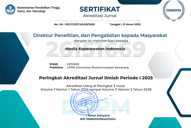Self management of type 2 diabetes mellitus patients in Tasikmalaya
(1) Program Sarjana Keperawatan, Fakultas Ilmu Kesehatan, Universitas Muhammadiyah Tasikmalaya
(2) Program Sarjana Keperawatan, Fakultas Ilmu Kesehatan, Universitas Muhammadiyah Tasikmalaya
(3) Program Sarjana Keperawatan, Fakultas Ilmu Kesehatan, Universitas Muhammadiyah Tasikmalaya
(4) Program Sarjana Keperawatan, Fakultas Ilmu Kesehatan, Universitas Muhammadiyah Tasikmalaya
(*) Corresponding Author
Abstract
Keywords
Full Text:
PDFReferences
Damayanti RA, Muniroh L. Perbedaan tingkat kecukupan zat gizi dan riwayat pemberian asi eksklusif pada balita stunting dan non stunting 2016;11:61–9. https://doi.org/doi.org/10.20473/mgi.v11i1.61-69.
Sundari PM, Asmoro CP, Arifin H. hubungan tingkat pengetahuan dan diabetes self-management dengan tingkat stres pasien 2019;22:31–42. https://doi.org/10.7454/jki.v22i1.780.
Jamil M, Ardayanti L. Hubungan Pengetahuan dan Sikap Pasien dengan Kepatuhan Penatalaksanaan Diabetes Melitus di Poliklinik Khusus Penyakit Dalam RSUP Dr. M. Djamil Padang 2021;21:911–5. https://doi.org/10.33087/jiubj.v21i2.1581.
International Diabetes Federation. IDF Diabetes Atlas Eighth Edition 2019, International Diabetes Federation; 2019.
Kemenkes. Infodatin 2020 Diabetes Melitus Pusat Data dan Informasi Kementerian Kesehatan RI. Jakarta: 2020.
Riset Kesehatan Dasar. Badan Penelitian dan Pengembangan Kesehatan, Jakarta: Departemen Kesehatan, Republik Indonesia; 2018.
DINKES. Prevalensi penyakit Diabetes Malitus. Tasikmalaya: 2021.
Heriyadi MR. Hubungan Self Management Dengan Kualitas Hidup Pasien Diabetes Melitus Di Puskesmas Landasan Ulin The Relationship Of Self-Management With The Quality Of Life Of Diabetes Mellitus Patients At Puskesmas Landasan Ulin Pendahuluan Gaya hidup tidak sehat dewa 2020;11. https://doi.org/10.33859/dksm.v11i1.545.
Hidayah M. Hubungan Perilaku Self-Management Dengan Kadar Gula Darah Pada Pasien Diabetes Mellitus Tipe 2 Di Wilayah Kerja Puskesmas Pucang Sewu , Surabaya The Relationship between Self-Management Behaviour and Blood Glucose Level in Diabetes Mellitus Type 2 Patient 2019:176–82. https://doi.org/10.2473/amnt.v3i3.2019.176-182.
Andoko A, Pangesti DN, Nurhayati N. Hubungan pengetahuan dengan motivasi mencegah komplikasi pada penderita diabetes melitus. Holistik Jurnal Kesehatan 2020;14:257–63. https://doi.org/10.33024/hjk.v14i2.1478.
Ningrum TP, Alfatih H, Siliapantur HO. Faktor-Faktor Yang Memengaruhi Manajemen Diri Pasien DM Tipe 2 2019;7:114–26.
Citra Windani M, , Mohammad Abdul Z, Udin Rosidin. gambaran self-manajemen pada pasien diabetes melitus tipe ii di puskesmas tarogong kabupaten garut. Jurnal Kesehatan Komunitas Indonesia 2019;15:1–11.
Brahmantia B, Falah M, Lismayanti L, Erviana V. Family’s Ability to Take Care The Patient of Type 2 Diabetes Mellitus in Tasikmalaya. Media Keperawatan Indonesia 2020;3:150. https://doi.org/10.26714/mki.3.3.2020.150-158.
Luthfa I, Fadhilah N. Self Management Menentukan Kualitas Hidup Pasien Diabetes Mellitus 2019;4:397–405.
Luthfa I, Fadhilah N. Self Management Menentukan Kualitas Hidup Pasien Diabetes Mellitus 2019;4:397–405.
Larasati RA, Harbuwono DS, Rahajeng E, Pradipta S, Nuraeni HS, Susilowati A, et al. The role of butyrate on monocyte migration and inflammation response in patient with type 2 diabetes mellitus. Biomedicines 2019;7:1–13. https://doi.org/10.3390/biomedicines7040074.
Anggraeni, N. C., Widayati, N., & Sutawardana JH. Peran Perawat sebagai Edukator terhadap Persepsi Sakit pada Pasien Diabetes Mellitus Tipe 2 di Kabupaten Jember. Pendidikan Keperawatan Indonesia 2020;6:66–76.
Azis WA, Muriman LY, Burhan SR. Hubungan Tingkat Pengetahuan dengan Gaya Hidup Penderita Diabetes Mellitus. Jurnal Penelitian Perawat Profesional 2020;2:105–14. https://doi.org/10.37287/jppp.v2i1.52.
Arindari DR, Suswitha D. Faktor-Faktor Yang Berhubungan Dengan Diabetes Self Management Pada Penderita Diabetes Mellitus Dalam Wilayah Kerja Puskesmas. Jurnal ’Aisyiyah Medika 2021;6. https://doi.org/10.36729/jam.v6i1.561.
Kurniawaty, Evi; Yanita B. Faktor-Faktor yang Berhubungan dengan Kejadian Diabetes Melitus Tipe II Risk Factors Related Type 2 Diabetes Mellitus Evidance. Majority 2016;5:27–31.
Article Metrics
Abstract view : 780 timesPDF - 18 times
DOI: https://doi.org/10.26714/mki.6.2.2023.104-109
Refbacks
- There are currently no refbacks.
Copyright (c) 2023 Miftahul Falah, Lilis Lismayanti, Nina Pamela Sari, Apep Ibnu Mu’ti

This work is licensed under a Creative Commons Attribution 4.0 International License.
This journal is indexed by:
Kedungmundu Raya No. 18 Semarang NRC Building Universitas Muhammadiyah Semarang
Phone: 02476740287
Fax: 02476740287
Email: [email protected]





















